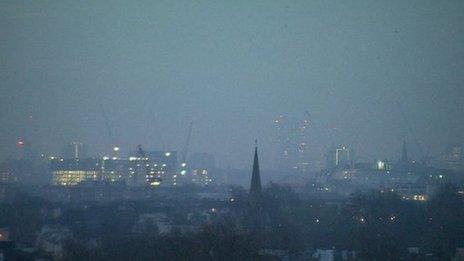Air pollution reaches high levels in parts of England
- Published
The pollution has caused a thick layer of dust to form on cars and buildings, as Pallab Ghosh reports
Air pollution in parts of England has reached high levels in the past 24 hours, Defra has said.
People with health problems have been warned to take particular care because of the pollution - a mix of local emissions and dust from the Sahara.
Greater London, rural areas of south-east England and East Anglia's towns and cities experienced the high levels.
People with lung or heart disease are among those warned against exercising outside in the affected areas.
The elderly could also be particularly affected by high levels of air pollution.
Defra (the Department for Environment, Food & Rural Affairs) has a 10-point scale for measuring air quality - with level one implying a "low" risk of air pollution and 10 for "very high" levels.
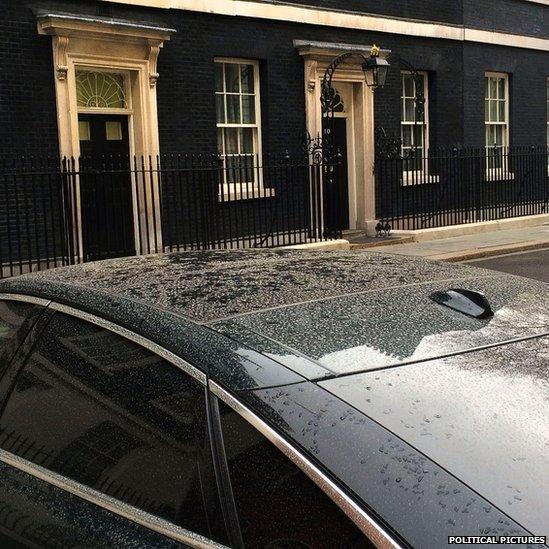
Prime Minister David Cameron's car has been covered in Sahara dust
On Wednesday, levels were recorded at eight - meaning high - in rural parts of south-east England and towns and cities near busier roads in East Anglia.
In London, air pollution levels were recorded at level seven, which is also in the "high" category.
Moderate levels of pollution were recorded in the Midlands, Yorkshire and Humberside, and north-west England and Merseyside.
Defra said the air pollution on Wednesday was not as high as it had been in recent days. Level 10 air pollution was recorded in north-west Norfolk on Tuesday, as well as in the East Midlands, Yorkshire and Humberside on Monday.
Levels are determined by the concentration of five pollutants in the air - ozone, sulphur dioxide (SO2), nitrogen dioxide (NO2) and two types of particulate matter.
High levels of air pollution are usually reached about five times a year, Defra said.
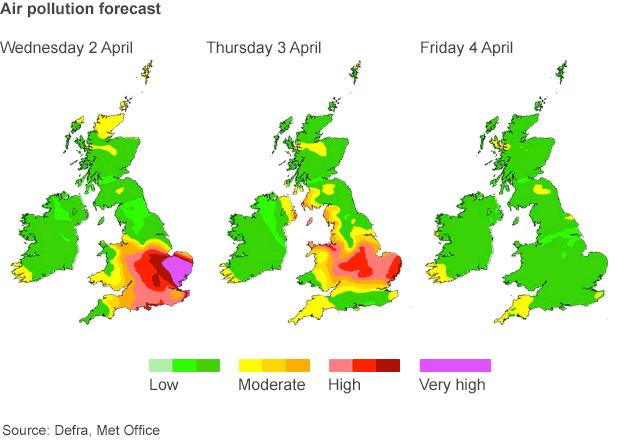
It is predicted that high levels will be recorded on Thursday in East Anglia, the Midlands, parts of north and east Wales, areas of north-west England and south-west Scotland.
The pollution is expected to clear in most places by Friday.
BBC Weather presenter Tomasz Schafernaker said Atlantic winds would blow away the pollution, improving air quality.
Dr Keith Prowse, honorary medical adviser to the British Lung Foundation, warned higher pollution levels could have a "significant impact" on people with respiratory conditions.
"People who use a reliever inhaler should make sure that they carry it with them. If they feel that their conditions are worsening then they should contact their GPs," he said.
Kay Boycott, chief executive of Asthma UK, said the two-thirds of people with asthma who find that air pollution makes their condition worse "will be at an increased risk of an attack".
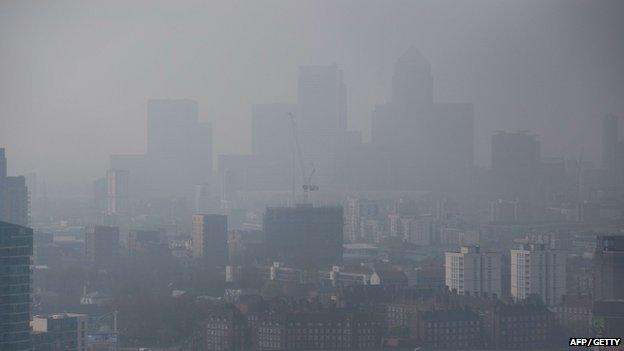
Air pollution lowered levels of visibility in London
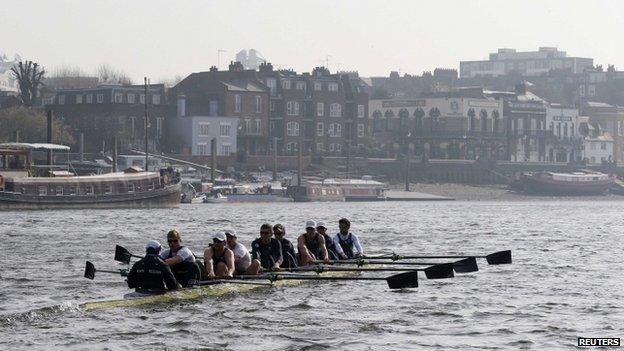
The air was hazy as Oxford University's rowing crew took part in a training session ahead of the Boat Race
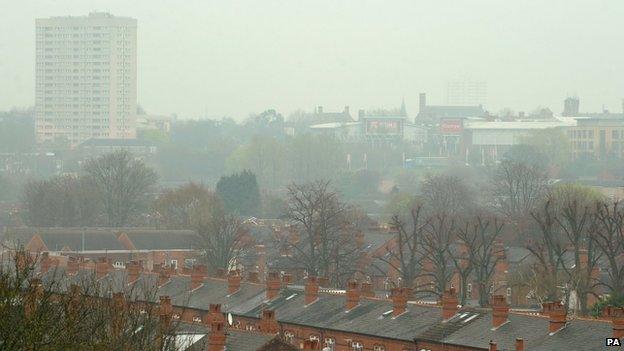
Birmingham was among places in the Midlands experiencing air pollution
Advice on the Defra website, external states that for high levels of pollution "adults and children with lung problems, and adults with heart problems, should reduce strenuous physical exertion, particularly outdoors, and particularly if they experience symptoms.
"People with asthma may find they need to use their reliever inhaler more often. Older people should also reduce physical exertion."
It adds that "anyone experiencing discomfort such as sore eyes, cough or sore throat should consider reducing activity, particularly outdoors".
In February, the European Commission launched legal proceedings against the UK for failing to reduce levels of NO2 air pollution.
On Wednesday, Defra admitted it was a "challenge" to meet air pollution targets near busy roads but said air quality had "improved significantly" in recent decades.
Joe Hennon, the European Commission's spokesman on pollution, said around 30,000 people in the UK die prematurely every year from problems associated with air pollution and described it as a "silent killer".
A Defra spokeswoman said: "The high level of air pollution this week is due to a combination of local emissions, light winds, pollution from the continent and dust blown over from the Sahara.
"We want to keep improving air quality and have introduced a new five-day forecast service, external in addition to investing heavily in local and transport initiatives to tackle this issue head-on."
Meanwhile, Maria Arnold, from the environmental law group Client Earth, called for changes to the way pollution warnings are given, saying the public was "generally very poorly warned about these type of events".
"We think the [warning] format needs to become very similar to the warnings for floods and heatwaves. It is really important people understand the risks."
Friends of the Earth air pollution campaigner Jenny Bates said air pollution was a "national disgrace".
"There's not much we can do to control dust from the Sahara, but the authorities could and should be doing far more to deal with the UK's contribution to this air pollution episode, particularly from road traffic emissions," she said.
- Published2 April 2014
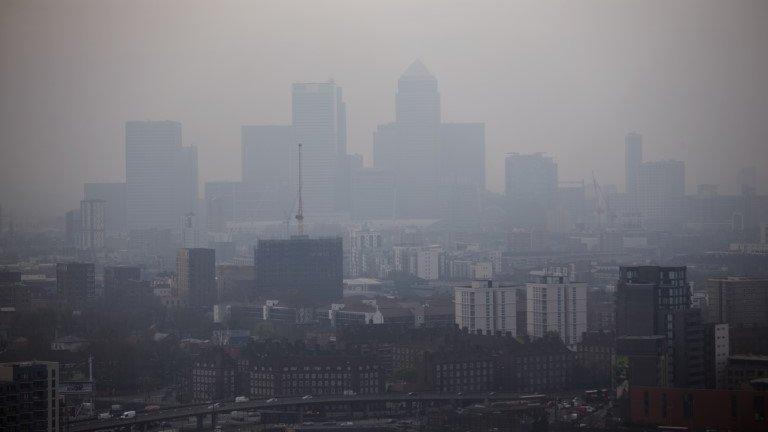
- Published2 April 2014
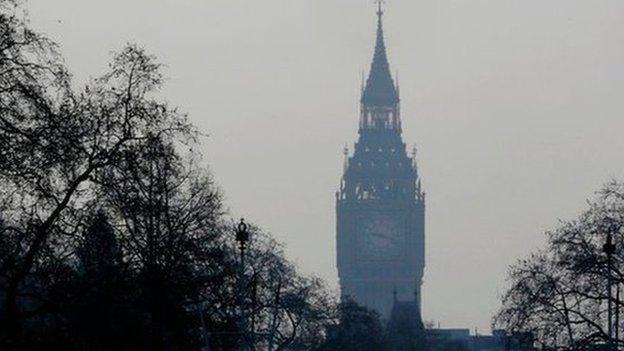
- Published2 April 2014
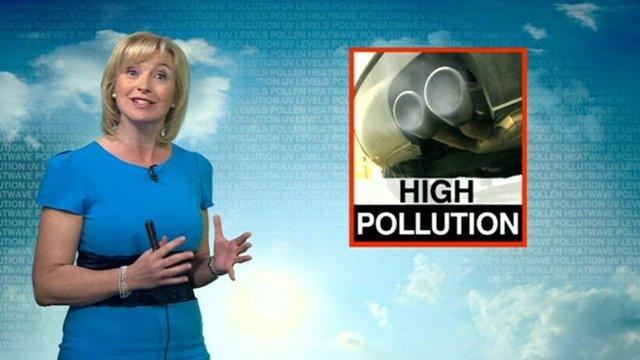
- Published2 April 2014

- Published2 April 2014
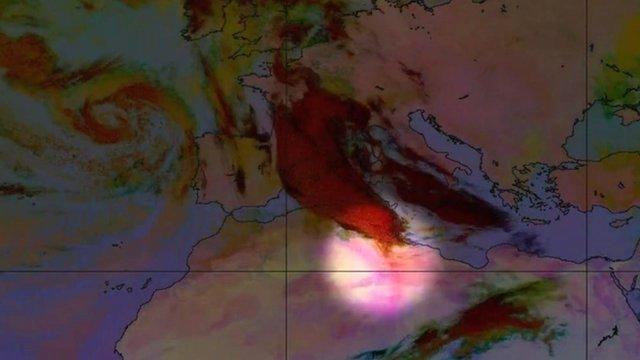
- Published2 April 2014
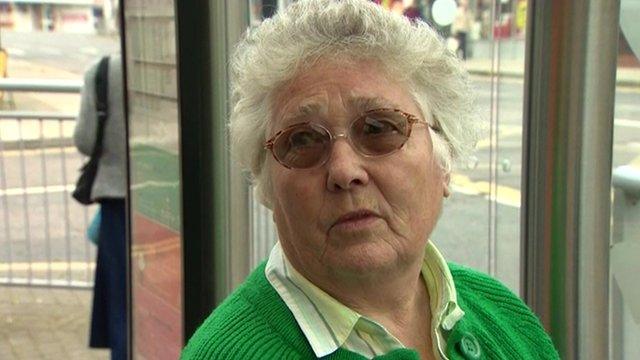
- Published2 April 2014

- Published2 April 2014
